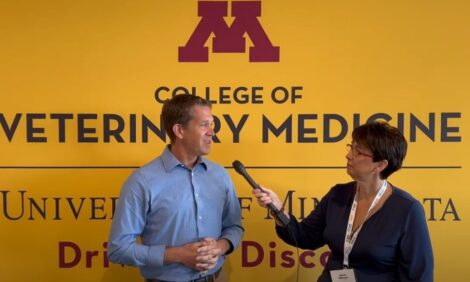



Scientists are developing antibiotic alternatives to treat pigs for PID
Researchers in Kenya, the US, Canada and the UK collaborate in probiotic trialsScientists at the University of Nairobi are developing a healthier and more affordable alternative to antibiotics to address a disease in pigs known as porcine infectious diarrhea (PID).
The scientists in Kenya are collaborating with counterparts from The Ohio State University to identify probiotics that could save pig farmers the trouble of buying and (mis)using antibiotics.
The IDRC-supported project is looking into which probiotics would work best to combat rotavirus in pigs and in what doses. The probiotics under trial are currently being administered in solution form to the farm animals.
PID is caused by rotaviruses that animals are exposed to in contaminated environments, said Dr. Joshua Onono, a veterinarian who is leading the team of scientists in the research project. He explained that rotaviruses affect piglets in particular, causing diarrhea that can lead to stunted growth.
“They will lose weight and the farmer will spend more on feed,” Onono stated. “This, together with costs incurred in treatment, will eat into the farmer’s profits.”
The challenge with rotaviruses, added Onono, is that they spread quickly within a herd and contaminate the environment. They also affect other farm animals like poultry.
“The only way for a farmer to rid the farm of the virus is by depleting the infected stock and staying without animals for some time, while disinfecting the farm throughout, before introducing a new and healthy herd,” Onono said.
This is a situation that pig farmers like Lydia Karume are keen to avoid. Karume, who has a pig farm in Kenya’s Murang’a County, said that diarrhea is the major cause of death among her piglets.
“The diarrhea is usually virulent: in some piglets they start to have diarrhea in the morning and by sunset they are dead,” she said. “As a pig farmer, you need to have medicines — or the money to acquire them — ready at all times so that you can respond quickly,” Karume added.
Probiotics showing promise as a treatment option
Infection with rotavirus can lead to secondary bacterial infection, and thus the possibility that veterinarians might prescribe antibiotics as part of treatment, said Onono. He added that antibiotics are also easily accessible from agricultural veterinarians countrywide.
Antibiotics are meant to treat pathogenic bacteria. Antimicrobial resistance (AMR) occurs when antibiotics are used in response to viral diseases.
“This unchecked and broad use of antibiotics by farmers in response to diarrhea in pigs — caused by rotaviruses — is leading to antimicrobial resistance,” Onono stated.
Probiotics, on the other hand, are good bacteria that are beneficial to an animal’s health functions.
“The probiotics we are using have shown great promise: they bind the virus and block it from infecting healthy cells. Or they bind epithelial cells lining the gut, blocking the virus from accessing healthy cells,” Onono explained.
Based on experiments conducted at Ohio State University, the probiotics being tested have already worked in combating the virus under restricted conditions in the laboratory.
“What we are doing now is testing how well the probiotics would work under field conditions to see if it is replicable in farms,” said Alfred Mainga, one of the Kenyan scientists involved in the project.
Human health at risk from antimicrobial resistance
The team’s research is important because rotaviruses are zoonotic and therefore transmissible between animals and human beings.
“The virus can easily jump to a human population,” Onono said. “Remember, in most farms, we use manure to grow food. Farmers also interact in close contact with the animals. So, such a scenario is not really far-fetched.”
Broad use of antibiotics, noted Onono, increases the chances of animal products with antibiotic residues making it to the market. Products such as meat that still have antibiotic residues transfer the active ingredients to the human population, setting off another route to the development of AMR in people.
“AMR leads to many pathogenic bacteria developing the ability to withstand available antibiotic treatments and therefore cause greater havoc in the human population,” he noted. “We have to be careful to make sure no antibiotic moves from animals to humans.”
This research project is part of the Innovative Veterinary Solutions for Antimicrobial Resistance (InnoVet-AMR) initiative, a four-year, CAD 30 million partnership between IDRC and the UK Department of Health and Social Care. It aims to address the emerging global threat of antimicrobial resistance by minimizing the misuse of antibiotics in animal production in the Global South.
Lean more about the Innovet-AMR initiative






